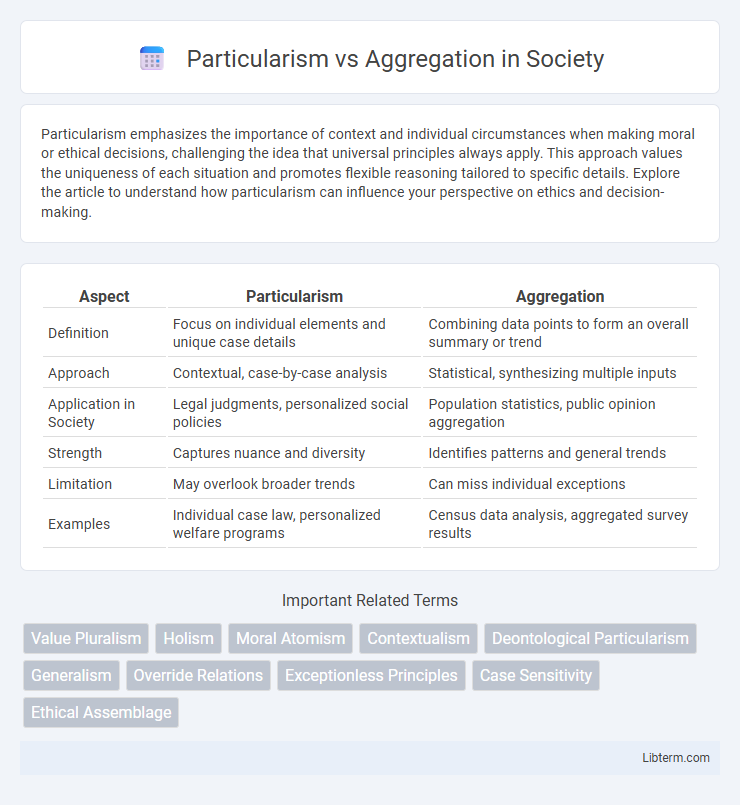Particularism emphasizes the importance of context and individual circumstances when making moral or ethical decisions, challenging the idea that universal principles always apply. This approach values the uniqueness of each situation and promotes flexible reasoning tailored to specific details. Explore the article to understand how particularism can influence your perspective on ethics and decision-making.
Table of Comparison
| Aspect | Particularism | Aggregation |
|---|---|---|
| Definition | Focus on individual elements and unique case details | Combining data points to form an overall summary or trend |
| Approach | Contextual, case-by-case analysis | Statistical, synthesizing multiple inputs |
| Application in Society | Legal judgments, personalized social policies | Population statistics, public opinion aggregation |
| Strength | Captures nuance and diversity | Identifies patterns and general trends |
| Limitation | May overlook broader trends | Can miss individual exceptions |
| Examples | Individual case law, personalized welfare programs | Census data analysis, aggregated survey results |
Introduction to Particularism and Aggregation
Particularism emphasizes the importance of individual cases and their unique contexts in ethical decision-making, rejecting one-size-fits-all principles. Aggregation, by contrast, prioritizes the overall sum of benefits and harms, often measured quantitatively to guide moral judgments. Understanding the tension between particularism and aggregation is crucial for evaluating ethical frameworks in philosophy and applied ethics.
Defining Particularism: Core Concepts
Particularism emphasizes the moral significance of individual cases and context over universal rules, rejecting the idea that ethical decisions should rely solely on fixed principles. It asserts that moral judgment is sensitive to specific features and relationships unique to each situation, advocating for a nuanced approach to ethics. Core concepts include attentiveness to detail, the variability of moral reasons, and the rejection of ethical generalism, highlighting the importance of situational factors in moral reasoning.
Understanding Aggregation: Key Principles
Aggregation involves combining individual interests or values into a collective decision, emphasizing the overall welfare rather than specific cases. Key principles include impartiality, consistency, and the maximization of total benefit, ensuring fair treatment across diverse preferences. This approach contrasts with particularism by prioritizing collective outcomes over context-dependent considerations.
Historical Background and Philosophical Roots
Particularism and Aggregation stem from distinct philosophical traditions rooted in moral philosophy and ethics. Particularism, influenced by Aristotle and later moral particularists, emphasizes the context-dependent nature of ethical judgments without fixed moral principles. Aggregation, rooted in utilitarianism and the works of Jeremy Bentham and John Stuart Mill, prioritizes the summation of individual benefits or harms to determine moral actions based on overall utility.
Comparative Analysis: Particularism vs Aggregation
Particularism emphasizes evaluating each case or element based on its unique characteristics, prioritizing context-specific judgment over generalized rules. Aggregation relies on combining individual data points or entities to form a collective assessment, often used in decision-making models and statistical analysis. Comparative analysis reveals particularism's strength in handling nuanced, variable situations, while aggregation excels in providing broad, scalable insights from large datasets.
Strengths and Weaknesses of Particularism
Particularism emphasizes the importance of individual cases and contexts in ethical decision-making, allowing for flexibility and sensitivity to unique circumstances. Its strength lies in avoiding rigid, one-size-fits-all rules, fostering nuanced judgments aligned with real-life complexity. However, its weakness includes potential inconsistency and difficulty in establishing universal standards, which can lead to subjective or biased outcomes.
Advantages and Limitations of Aggregation
Aggregation enables the synthesis of diverse data points into a comprehensive overview, facilitating macro-level analysis and trend identification in fields like economics and market research. Its advantages include scalability and the ability to reveal patterns that individual data points might obscure. Limitations arise from potential loss of detail, oversimplification, and the risk of masking individual variations critical for nuanced decision-making.
Real-World Applications and Case Studies
Particularism emphasizes evaluating ethical decisions based on the specific details and contexts of each case, often demonstrated in legal systems prioritizing individual circumstances over rigid rules. Aggregation, prevalent in utilitarian frameworks, aggregates outcomes to maximize overall benefits, as seen in public health policies that prioritize population-wide welfare despite individual sacrifices. Real-world applications reveal that particularism suits complex, variable environments like medical ethics, whereas aggregation drives large-scale policymaking in economics and resource allocation.
Ethical and Practical Implications
Particularism emphasizes the importance of context and individuality in ethical decision-making, allowing for nuanced judgments based on specific circumstances rather than applying universal principles rigidly. Aggregation focuses on maximizing overall outcomes, often measured through utility or collective benefit, which can lead to more straightforward, scalable decisions but may overlook individual rights or exceptional cases. Ethical implications involve balancing fairness and sensitivity to unique situations, while practical implications concern the efficiency and consistency of applying moral rules across diverse cases.
Conclusion: Finding a Balanced Approach
A balanced approach between particularism and aggregation enhances decision-making by integrating the nuanced context of individual cases with the efficiency of generalized data analysis. Emphasizing situational details helps avoid the pitfalls of overgeneralization, while leveraging aggregated insights ensures scalable and consistent outcomes. Effective strategies combine both methods to optimize accuracy and applicability across diverse scenarios.
Particularism Infographic

 libterm.com
libterm.com